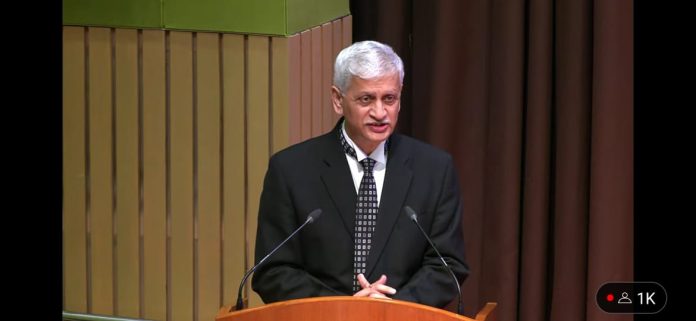Former Chief Justice of India Uday Umesh Lalit has said that there was no reason to change the current system of appointment of judges through Collegium.
Speaking on “Why Study Law: Social Duty and Legal Responsibility” at the inaugural session of the 12th edition of ThinkEdu Conclave on Thursday, Justice Lalit said that he never felt the ‘pulls’ and ‘pressures’ of the executive while serving as the Chief Justice of India.
Justice Lalit said that the Chief Justice of a country, apart from being a judge, was also the administrative head of the Supreme Court.
He elaborated by saying that apart from constituting benches and listing matters, the CJI had to look at the administrative aspect also, which included responsibilities as the head of the Supreme Court Collegium.
Stating that it was the CJI, who would call meetings and make proposals for the appointment of Judges, Justice Lalit said that on either of these two fronts, he was never subjected to any kind of instructions or even indirect suggestions from the executive at any juncture.
Speaking about his short tenure of 74 days as the 49th CJI, he said never in the history of the Supreme Court, more than two Constitution benches had ever sat together.
As per Justice Lalit, since the Apex Court had a strength of 30 Judges during his tenure, he went by mathematical calculation and constituted six Constitution Benches having five Judges each.
At a time on one particular day, three Constitution benches were sitting together simultaneously, he added.
The former CJI said that he had absolutely no regrets in his tenure, as he delivered on all three promises that he had made.
Speaking about the Covid-19 pandemic, he said disposal of cases took a back seat during that time as a matter that usually took three minutes for disposal in physical courts, in online mode, the time increased to 10 minutes due to communication gaps and defects.
The disposal of cases, which was earlier 60 on miscellaneous days such as Mondays and Fridays, had come down to almost 30-35 during the online mode. The Judges adapted themselves to the virtual mode and tried to make themselves more accessible during these trying times, added the former CJI.
He said the gap between the filing of cases and their disposal increased and this led to shifting of priorities.
Justice Lalit said that he focused on listing all matters, increasing the number of cases disposed of, and increasing the number of Constitution Benches.
Talking about death sentences, Justice Lalit said that such matters could only get listed before three-Judge Benches. So when he constituted the Constitution Benches, he made sure each Constitution Bench had five Judges.
In that way, the death sentence matters were listed before the Constitution Benches, he added.
Speaking about practical experience in the area of law, the former CJI said that study of law must not be confined to Universities and colleges alone, but must be open to the masses and the societal apparatus.
He laid emphasis on introducing such internships, where students worked with the rural population, holding interactions, and understanding their problems and challenges.
The former CJI said mandatory internships should be introduced for law students to work in rural areas with rural population.
Regarding his decision on switching over from the Bar to the Bench, Justice Lalit said that although money was important, after a point, it lost significance in life and one ultimately needed something which gave them satisfaction.
He concluded by saying that he was playing his third innings currently, as a visiting professor in Law Colleges. The former CJI said this was his way of giving something back to the society.


